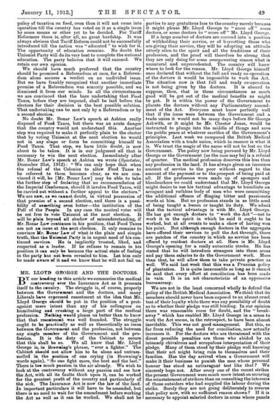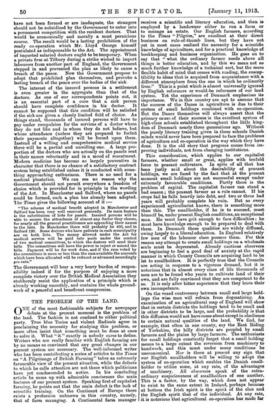MR. LLOYD GEORGE AND THE DOCTORS.
BY our heading to this article we summarize the medical controversy over the Insurance Act as it presents itself to the country. The struggle is, of course, properly between the G-overament and the doctors, and many Liberals have expressed resentment at the idea that Mr. Lloyd George should he put in the position of a prot- agonist more intent than any of his colleagues on humiliating and crushing a large part of the medical profession. Notlaiag would please us better than to know that that resentment was well founded. The struggle ought to be practically as well as theoretically an issue between the Government and. the profession, not between any single member of the Government and the pro- fession. It is the duty of the Cabinet to secure that this shall be so. We all know that Mr. Lloyd George is, in Browning's phrase, "ever a fighter." The Cabinet should not allow him to be alone and untram- melled in the position of one crying (in Browning's words again), "So one fight more, the best and the last." There is to. much passion in the air already. We wish to look at the controversy without any passion and see how the Act, with all its faults thick upon it, can he worked for the greatest profit of the country and particularly of the sick. The Insurance Act is now the law of the land. In important particulars it will have to be amended, but there is no need to wait for the amendment before working the Act as well as it can be worked. We shall not be
parties to any gratuitous loss to the country merely because it might please Mr. Lloyd George to "score off" some doctors, or some doctors to " score off" Mr. Lloyd George. If a large number of doctors are coerced into a position of withholding their service, or of boycotting those who are giving their service, they will be adopting an attitude utterly alien to the spirit and all the traditions of their profession, and the proof will therefore be strong that they are only doing for some overpowering reason what is unnatural and. unprecedented. The country will know where to look for the reason. Mr. Lloyd George himself once declared that without the full and ready co-operation of the doctors it would be impossible to work the Act. The situation now is that full and ready co-operation is not being given by the doctors. It is absurd to suppose, then, that in these circumstances as much good will be got out of the medical benefits as might be got. It is within the power of the Government to placate the doctors without any Parliamentary amend- ment of the Act. Everyone must know perfectly well that if the issue were between the Government and a trade union it would not be many days before Sir George Askwith, or it might be Mr. Chester Jones, would be instructed to plunge into the middle of things and save the public peace at whatever sacrifice of the Government's principles. Last week we compared the British Medical Association with a trade union, which in essence is what it is. We trust the magic of the name will not be lost on the Government. The policy now being pursued by Mr. Lloyd George or the Government (as the case may be) is a refusal of quarter. The medical profession deserves this less than any profession in the land. It has always given an inunense amount of service to the poor without regard to the amount of the payment or to the prospect of being paid at all. If the profession were made up of spongers and bloodsuckers we could understand that Mr. Lloyd George might desire to use his tactical advantage to humiliate an arrogant and. ruthless body of men who were committing the additional offence of flinging bitter and passionate words at him. But no profession stands in so little need of being taught a lesson or taught its duty. We admit that the tactical advantage is with Mr. Lloyd. George. He has got enough doctors to "work the Act "—not to work it in the spirit in which he said it ought to be worked, but at all events to make a show of having won his point. But although enough doctors in the aggregate have offered their services to pull the Act through, there are patches of the country in which no service has been offered by resident doctors at all. Here is Mr. Lloyd. George's opening for a really autocratic stroke. He has stated that he will introduce strangers into these areas and pay them salaries to do the Government work. More than that, he will allow them to take private practice as well. We said last week that this was a Prussian policy of plantation. It is quite inexcusable so long as it cannot be said that every effort at conciliation has been made in vain. It is an. act characteristic of an oppressive bureaucracy.
We are not in the least concerned wholly to defend the policy of the British Medical Association. We think that its members should never have been exposed to an almost cruel test of their loyalty while there was any possibility of doubt as to whether their pledge was still binding. In. our opinion. there was reasonable room for doubt, and the " break- away " which has enabled Mr. Lloyd George in a sense to work the Act seems, in the retrospect, to have been almost inevitable. This was not good management. But this, so far from reducing the need for conciliation, now actually increases it. For the doctors who are threatened with the direst possible penalties are those who abided by an intensely chivalrous and scrupulous interpretation of their pledge. Many of them stood by their pledge well knowing that their act might bring ruin to themselves and their families. Has the day arrived when a. Government will make it their business to punish the men whose personal honour has stood an extravagant test like that ? We sincerely hope not. After every one of the recent strikes the present Government were much more intent on securing the reinstatement of strikers than on consulting the interests of those outsiders who had supplied the labour during the strike. Surely they are not going deliberately to reverse that policy now, with no sufficient reason shown? If it is necessary to appoint salaried doctors in areas where panels have not been formed or are inadequate, the strangers should not be subsidized by the Government to enter into a. permanent competition with the resident doctors. That would be economically and morally a most pernicious course. The result would be a lasting prohibition of the ready co-operation which Mr. Lloyd George himself postulated as indispensable to the Act. The appointment of imported salaried doctors ought to be temporary. When a private firm at Tilbury during a strike wished to import labourers from another part of England, the Government stepped in and prevented the plan as likely to cause a breach of the peace. Now the Government propose to adopt that prohibited plan themselves, and provoke a lasting breach of the peace over the bodies of the sick.
The interest of the insured persons in a settlement is even greater in the aggregate than that of the doctors. As one of our correspondents points out, it is an essential part of a cure that a sick person should have complete confidence in his doctor. It cannot be supposed that this condition will be satisfied if the sick are given a closely limited field of choice. As things stand, thousands of insured persons will have to pay under compulsion for the services of a doctor whom they do not like and in whom they do not believe, but whose attendance (unless they are prepared to forfeit their payments altogether) will be forced upon them. Instead of a willing and comprehensive medical service there will be a partial and unwilling one. A large pro- portion of the doctors who are actually on the panels sent in their names reluctantly and in a mood of resentment. Modern medicine has become so largely preventive in character that there is no chance of a satisfactory contract system being established unless it is conducted with some- thing approaching enthusiasm. There is no need for a medical plantation. We can see no reason why the Government should not permit everywhere a freedom of choice which is provided for in principle in the wording of the Act. In Manchester and Salford, where no panels could be formed, such a plan has already been adopted. '1 ho Times gives the following account of it :— " The scheme of medical benefit adopted in Manchester and Salford has been very well received generally. Its main feature is the substitution of lists for panels. Insured persons will be able to secure the attendance of almost any doctor they choose, for nearly all the general practitioners are appending their names to the lists. In Manchester there will probably be 450, and in Salford 120. Some doctors who have patients in each municipality are on both lists. The money allowed under the Act for medical service will be paid into pools under the control of two medical committees, to which the doctors will send their
bills. The committees will have the power to reject or amend the bills. Payment will be for work done, and if the sum voted by the committees is more or less than the sum available the amounts which have been allocated will be reduced or advanced accordingly pro rata."
The Government will bear a very heavy burden of respon- sibility indeed if for the purpose of enjoying a more complete victory over the British Medical Association they stubbornly resist the application of a principle which is already working smoothly, and contains the whole ground- work of a peaceful and beneficent compromise.











































 Previous page
Previous page